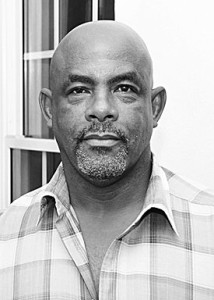
Mr Rommel Hughes, former CEO of the Anguilla Water Corporation, appeared on the political rostrum on Saturday, June 21, in support of Mr Edison Baird, the independent candidate for the Road North Constituency.
“Mr Baird has demonstrated that he can represent our interests both at home and abroad,” Mr Hughes asserted. “His honesty in public life is beyond reproach. He has shown that he is genuinely concerned about the welfare of his fellow human beings and citizens of Anguilla, and of the constituency of Road North in general. Therefore, ladies and gentlemen, I would strongly urge all of you in the sound of my voice, particularly those who are eligible to vote, in this constituency, to vote for Edison Alva Baird for the sixth time. He has served us well over the last twenty years and I know he will continue to do so into the future.”
Mr Hughes spoke on three matters which he believed were of much concern to the people of Anguilla and which reflected the thoughts of the Government. “Some of the talk coming out of this administration is about the introduction of Valued Added Tax,” he stated. “This tax, ladies and gentlemen, is bad, bad news – very bad news for both small businesses and Government alike. The people of Anguilla should know about this tax—and if they don’t know – they should research the history of Value Added Tax in the Caribbean.
“None of the islands, where it has been tried, has ever implemented it successfully. In fact, research has shown that for small businesses it dramatically increases the cost of doing business as additional man hours would be required to keep track of what is purchased, what is sold, and what taxes should be paid over to the Government.” He recalled that in a study conducted for one of the Overseas Territories, a British consultant concluded that in small jurisdictions such as Anguilla, Cayman Islands, Turks and Caicos Islands and Montserrat, the cost of administering VAT would be far too high, compared with the benefits accrued from it.
The second issue he raised was the Interim Stabilisation Levy introduced by Government, half way into its term of office, to bolster the budget. “When we tax our economy, like we have done in the last four plus years, we remove the oil from the economic engine that the private sector would need to invest and to grow, and thereby expand and create jobs for our children,” Mr Hughes observed. “The Stabilisation Tax as it is applied presently, removes the incentives from these businesses to hire and thus prevents them from investing. I am therefore calling on this administration, since it has up to nine months more in office, to replace the so-called Stabilisation Levy because it is clearly damaging our economy.”
The third matter, on which Mr Hughes spoke, was renewable energy. He said at the last general meeting of ANGLEC, the chairman indicated that the renewable energy plans for Anguilla had been shelved. He reported that the chairman also stated that efforts were now being concentrated on a waste to energy project designed for the Corito area. He pointed to the fact that some of the larger electricity consumers were now turning to solar energy, among them being CuisinArt Golf Resort and Spa.
“Unfortunately, this administration has turned its back on solar energy… and is now preoccupied with a waste to energy plant,” he continued. “This preoccupation appears very misguided based on the available literature. After reading the EIA for the proposed project, nowhere is a reduced cost of energy listed as a potential benefit to the people of Anguilla. All of the potential benefits listed are of an environmental nature, but the same EIA has conveniently not addressed the potential damaging effects the project can have on the people living downwind from the plant. When one of the proponents of the project was questioned about the mitigating measures that these specific impacts might have, his response was that he will get back to us later. Two months later we are still waiting to hear from that proponent what the mitigating measures would be.”
Mr Hughes, a Civil Engineer, gave his assessment of some of the impacts of the project. He said the emissions of the plant would travel downwind, settle on rooftops and eventually be washed down into cisterns when rain falls. “The acid that goes into the cisterns will destroy them in no time and if you were to drink it, it will also kill you. Acid and cement or concrete just don’t mix,” he stated.
According to him, the EIA clearly indicated that fumes containing harmful nitrous and sulphurous oxides would be emitted from the plant. He also said that another harmful by-product was “char”, a residue from the incineration of waste. “This ‘char’ is highly toxic and poisonous and to date the proponents of the project cannot say what they will do with this ‘char’,” he went on. “The EIA indicates that it [the project] will produce a few tons of ‘char’ every year if this project were to go through. However, up to now, they cannot indicate where they would put it – whether in the sea or in some pond [other than our Road Pond] or bury it.”
Mr Hughes wondered why the project was being pursued by Government given the possible harmful impacts surrounding it. “What has happened to the other alternative sources of energy?” he asked. “We here in Anguilla have an abundance of sunshine. Why is solar energy not being pursued? At the very least, why hasn’t it been investigated?”








